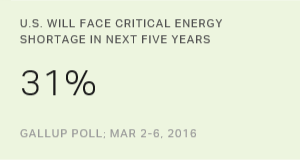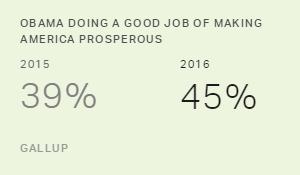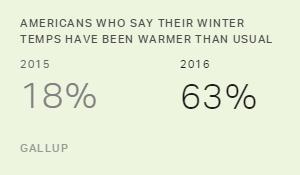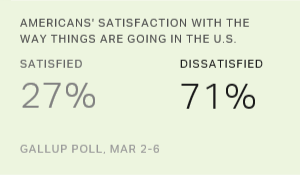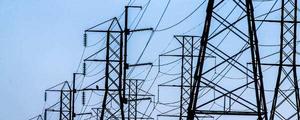Story Highlights
- 31% believe U.S. will face critical energy shortage during next five years
- This is down from 50% in 2012
- 28% describe energy situation in U.S. as very serious
PRINCETON, N.J. -- As Americans continue to pay relatively low prices for gas, they are now less likely than at any point in Gallup's trend to predict a critical energy shortage in the country in the next five years. Currently, 31% of Americans believe this will happen, down sharply from 50% when the question was last asked in 2012, and 14 percentage points below the previous low.
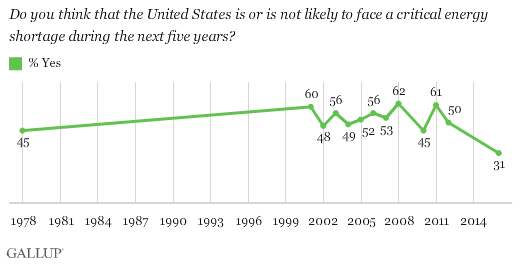
The results are from Gallup's annual Environment poll, conducted March 2-6.
The prior low point in Gallup's trend, first asked in 1978 and updated most years since 2001, was 45%. That occurred on two occasions: in November 1978 after President Jimmy Carter signed the National Energy Act, but before the 1979 oil crisis, and again in 2010.
Americans have been most likely to believe energy shortages were imminent when gas prices were high, as was the case in 2001, 2008 and 2011. The 2001 reading also came at a time when the state of California experienced a widely publicized energy crisis. Between 60% and 62% of Americans said the U.S. was likely to face an energy shortage in those three years.
Compared with when Gallup last asked the question in 2012, expectations of an impending U.S. energy shortage have significantly declined across all key subgroups. Among the groups least likely to believe the U.S. will face shortages are those with a postgraduate education (18%), upper-income Americans (22% of those whose annual household income is $75,000 or more), and men (22%).
By contrast, at least four in 10 lower-income Americans (those whose annual income is less than $30,000), young adults (18 to 29 years old), and nonwhites believe there will be an energy shortage, the highest among key subgroups.
Percentage Describing Energy Situation as Very Serious Near Historical Low
The decline in predictions of an energy shortage are consistent with the decreasing percentage of Americans who describe the U.S. energy situation as "very serious." Currently, 28% say it is very serious, similar to the last two years but down 14 points since 2012.
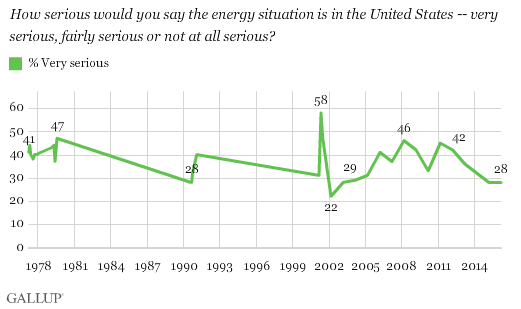
The high point in perceptions that the energy situation was very serious came in a May 2001 poll, when California had instituted "rolling blackouts" to address electricity shortages in that state and gas prices were rising nationwide.
Less than a year later, in March 2002, only 22% described the situation as very serious, the low point in the trend. That lower reading partly reflected not only the easing of the California energy crisis, but also Americans' changing priorities after the 9/11 terror attacks.
The 2002 poll was conducted just months after the 9/11 terror attacks, when terrorism was a dominant concern in Americans' minds. Even though the energy situation may have been worse in 2002 than it is today -- indeed, many more (48%) predicted a future energy shortage then compared with today (31%) -- Americans viewed the energy situation as less serious, arguably because other issues seemed far less serious compared with the threat of terrorism.
Worry About Energy at 15-Year Low
A separate question in the new survey finds 27% of Americans saying they worry "a great deal" about the "availability and affordability of energy." This ties a March 2003 reading as the lowest in Gallup's trend dating back to 2001. The level of worry was much higher in 2001 and in most years between 2006 and 2012.
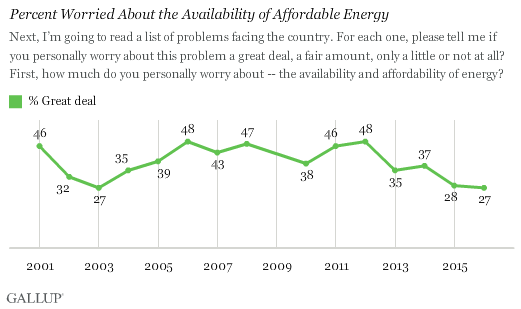
In addition to the 27% who worry a great deal about the availability and affordability of energy, another 34% say they worry "a fair amount." The total 61% who worry at least a fair amount is the lowest in Gallup's trend.
Implications
Americans' current assessments of the energy situation, taken as a whole, are the least negative Gallup has recorded in the past 15 years, if not dating back even further. A record-low 31% believe the U.S. is likely to face a critical energy shortage in the next few years, and slightly more than one in four describe the U.S. energy situation as very serious or say they worry a great deal about the availability and affordability of energy.
Low gas prices are likely the reason for the positive assessment, as the price at the pump is an obvious and frequent reminder to Americans about the U.S. energy supply. Regions of the U.S. and the world that produce energy are well aware of the oil glut, which has contributed to declining prices for consumers. In the past, Americans' concerns about the U.S. energy situation have been highest when gas prices were historically high or rising significantly.
Also, a warmer winter combined with lower heating costs only adds to Americans' contentment with the energy issue. Energy was a major issue discussed during the 2008 and 2012 presidential campaigns, but it may not receive much attention this year since Americans are less concerned about energy shortfalls or high energy prices.
Historical data are available in Gallup Analytics.
Survey Methods
Results for this Gallup poll are based on telephone interviews conducted March 2-6, 2016, with a random sample of 1,019 adults, aged 18 and older, living in all 50 U.S. states and the District of Columbia. For results based on the total sample of national adults, the margin of sampling error is ±4 percentage points at the 95% confidence level. All reported margins of sampling error include computed design effects for weighting.
Each sample of national adults includes a minimum quota of 60% cellphone respondents and 40% landline respondents, with additional minimum quotas by time zone within region. Landline and cellular telephone numbers are selected using random-digit-dial methods.
View complete question responses and trends.
Learn more about how the Gallup Poll Social Series works.
